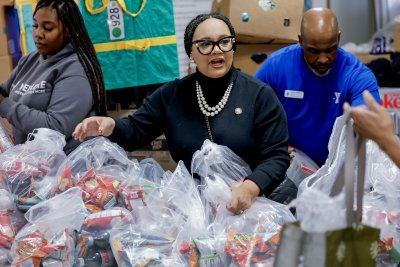
Rep. Nikema Williams, D-Ga., helps distribute food aid bags during a free food distribution at the Young Family YMCA in Atlanta on Thursday. The YMCA’s weekly neighborhood food distribution gave out nearly 10,000 pounds of food to about 400 families. Photo by Erik S. Lesser/EPA
Nov. 7 (UPI) — The Trump administration on Friday night appealed to the U.S. Supreme Court after a federal appeals court upheld a district judge’s order to pay full benefits in November to 42 million in the Supplemental Nutrition Assistance Program.
A short time earlier, the 1st District Circuit left in place a decision on Thursday by Rhode Island federal Judge Jack McConnell, who ordered the administration to pay out the full benefits within one day, saying, “People have gone without for too long.”
The three-member appeals court’s decision means the U.S. Department of Agriculture must take steps to disperse the electronic payments, which are staggered each month. Earlier Friday, the agency said it notified states that it is working to process the payments.
The panel was Chief Appellate Judge David Barron, appointed by President Barack Obama, and Gustavo Atavo Gelpi Jr. and Julie Rikelman, both picked by President Joe Biden.
The judges said that they are still considering a bid for longer relief while assessing the appeal.
Attorney General Pam Bondi posted on X the Trump administration will ask the Supreme Court to stay the Rhode Island-based lower court judge’s ruling, which she called “judicial activism at its worst.”
“A single district court in Rhode Island should not be able to seize center stage in the shutdown, seek to upend political negotiations that could produce swift political solutions for SNAP and other programs, and dictate its own preferences for how scarce federal funds should be spent,” Bondi said.
Seven days ago, McDonnell and U.S. District Court of Massachusetts Judge Indira Talwani told the Trump administration to access available funds to continue. They were both nominated by Obama.
On Monday, the administration told the judge it only had reserved money to pay out 50% of the total $9 billion cost. Then, it was raised to 65%.
The judge directed USDA to find $4 billion “in the metaphorical couch cushions.”
McConnell said the administration could use Section 32 funds, which the USDA uses to help with child nutrition programs. But the administration rejected that plan.
In the appeal, DOJ claimed that the judge’s order “makes a mockery of the separation of powers.” Lawyers said transferring funds would mean diverting money from Child Nutrition Programs.
“Unfortunately, by injecting itself with its erroneous short-term solution, the district court has scrambled ongoing political negotiations, extending the shutdown and thus undercutting its own objective of ensuring adequate funding for SNAP and all other crucial safety-net programs,” they said.
Plaintiffs in the case, which are nonprofit organizations, asked for the full payment, and McConnell agreed.
“The evidence shows that people will go hungry, food pantries will be overburdened, and needless suffering will occur” if SNAP is not fully funded, he said.
“While the president of the United States professes a commitment to helping those it serves, the government’s actions tell a different story,” McConnell wrote in a written order.
The federal government has been shut down since Oct. 1, and the shutdown is now the longest in history.
In every past shutdown, emergency funds have been used to fund the program.
McConnell also mentioned a social media post that Trump made, saying he refused to release any more funds until “the radical-left Democrats open up government, which they can easily do, and not before.”
The post was used as evidence that the administration would ignore McConnell’s order.